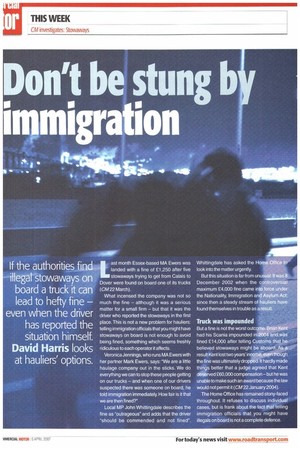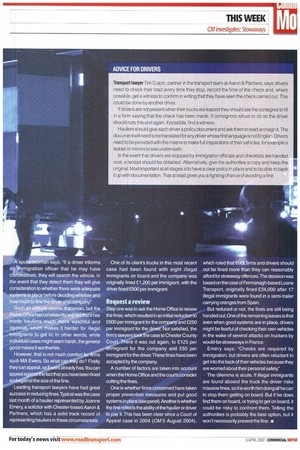on't be stung :b mmigration
Page 30

Page 31

If you've noticed an error in this article please click here to report it so we can fix it.
If the authorities find illegal stowaways on board a truck it can lead to hefty fine — even when the driver has reported the situation himself.
David Harris loo's at hauliers' options.
Last month Essex-based MA Ewers was landed with a fine of £1,250 after five stowawaystrying to get from Calais to Dover were found on board one of its trucks (CM 22 March).
What incensed the company was not so much the fine — although it was a serious matter for a small firm — but that it was the driver who reported the stowaways in the first place. This is not a new problem for hauliers: telling immigration off icials that you might have stowaways on board is not enough to avoid being fined, something which seems freshly ridiculous to each operator it affects.
Veronica Jennings, who runs MA Ewers with her partner Mark Ewers, says: "We are a little haulage company out in the sticks. We do everything we can to stop these people getting on our trucks — and when one of our drivers suspected there was someone on board, he told immigration immediately. How fair is it that we are then fined?"
Local MP John Whittingdale describes the fine as "outrageous" and adds that the driver "should be commended and not fined". Whittingdale has asked the Home Office to look into the matter urgently.
But this situation is far from unusual. It was 8 December 2002 when the controversial maximum £4,000 fine came into force under the Nationality, Immigration and Asylum Act; since then a steady stream of hauliers have found themselves in trouble as a result.
Truck was impounded
But a fine is not the worst outcome. Brian Kent had his Scania impounded in 2004 and was fined £14,000 after telling Customs that he believed stowaways might be aboard. As a result Kent lost two years" income, even though the fine was ultimately dropped, It hardly made things better that a fudge agreed that Kent deserved 260,000 compensation— but he was unable to make such an award because the law would not permit it (CM 22 January 2004), The Home Office has remained stony-faced throughout. It refuses to discuss individual cases, but is frank about the fact that telling immigration officials that you might have illegals on board is not a complete defence
5, spokeswoman says: If a driver informs an immigration officer that he may have ciandestines, they will search the vehicle. In the event that they detect them they will give consideration to whether there were adequate systems in place before deciding whether and how much to fine the driver and company."
Such an attitude seems draconian, but the Home Office has consistently argued that it has made hauliers much more watchful and rigorous, which makes it harder for illegal immigrants to get in. In other words, while individual cases might seem harsh, the general good makes it worthwhile.
However, that is not much comfort for ffrms such MA Ewers. So what can they do? Firstly they can appeal, as Ewers already has.You can appeal against the fact that you have been fined and against the size of the fine.
Leading transport lawyers have had great success in reducing fines.Typical was the case last month of a haulier represented by Joanne Emery, a solicitor with Chester-based Aaron & Partners, which has a solid track record of representing hauliers in these circumstances. One of its client's trucks in this most recent case had been found with eight illegal immigrants on board and the company was originally fined £1,200 per immigrant, with the driver fined £500 per immigrant.
Request a review Step one was to ask the Home Office to review the fines, which resulted in an initial reduction to £600 per immigrant for the company and l',250 per immigrant for the driver. Not satisfied, the firm's lawyers took the case to Chester County Court. There it was cut again, to £125 per immigrant for the company and --2_60 per immigrant for the driver. These fines have been accepted by the company.
A number of factors are taken into account when the Home Office and the courts Consider cutting the fines.
One is whether firms concerned have taken proper prevention measures and put good systems in place (see panel). Another is whether the fine reflects the ability of the haulier or driver to pay it. This has been clear since a Court of Appeal case in 2004 (CM 5 August 2004), which ruled that trittfirms and drivers should not be fined more than they can reasonably afford for stowaway offences.The decision was based on the case of Fermanagh-based Loane Transport, originally fined £34,000 after 17 illegal immigrants were found in a semi-trailer carrying oranges from Spain.
But reduced or not, the fines are still being handed out. One of the remaining issues is that even when good systems are in place, drivers might he tearful of checking their own vehicles in the wake of several attacks on truckers by would-be stowaways in France.
Emery says: "Checks are required by immigration, but drivers are often reluctant to get into the back of their vehicles because they are worried about their personal safety:' The dilemma is acute. if illegal immigrants are found aboard the truck the driver risks massive fines, soil is worth him doing all he can to stop them getting on board. But if he does find them on board, or trying to get on board, it could be risky to confront them. Telling the authorities is probably the best option, but it won't necessarily prevent the fine, ir






























































































































































































